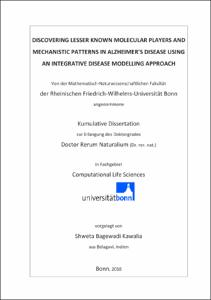Discovering lesser known molecular players and mechanistic patterns in Alzheimer's disease using an integrative disease modelling approach

Discovering lesser known molecular players and mechanistic patterns in Alzheimer's disease using an integrative disease modelling approach

| dc.contributor.advisor | Hofmann-Apitius, Martin | |
| dc.contributor.author | Kawalia, Shweta Bagewadi | |
| dc.date.accessioned | 2020-04-25T12:17:31Z | |
| dc.date.available | 2020-04-25T12:17:31Z | |
| dc.date.issued | 13.12.2018 | |
| dc.identifier.uri | https://hdl.handle.net/20.500.11811/7649 | |
| dc.description.abstract | Convergence of exponentially advancing technologies is driving medical research with life changing discoveries. On the contrary, repeated failures of high-profile drugs to battle Alzheimer's disease (AD) has made it one of the least successful therapeutic area. This failure pattern has provoked researchers to grapple with their beliefs about Alzheimer's aetiology. Thus, growing realisation that Amyloid-β and tau are not 'the' but rather 'one of the' factors necessitates the reassessment of pre-existing data to add new perspectives. To enable a holistic view of the disease, integrative modelling approaches are emerging as a powerful technique. Combining data at different scales and modes could considerably increase the predictive power of the integrative model by filling biological knowledge gaps. However, the reliability of the derived hypotheses largely depends on the completeness, quality, consistency, and context-specificity of the data. Thus, there is a need for agile methods and approaches that efficiently interrogate and utilise existing public data. This thesis presents the development of novel approaches and methods that address intrinsic issues of data integration and analysis in AD research. It aims to prioritise lesser-known AD candidates using highly curated and precise knowledge derived from integrated data. Here much of the emphasis is put on quality, reliability, and context-specificity. This thesis work showcases the benefit of integrating well-curated and disease-specific heterogeneous data in a semantic web-based framework for mining actionable knowledge. Furthermore, it introduces to the challenges encountered while harvesting information from literature and transcriptomic resources. State-of-the-art text-mining methodology is developed to extract miRNAs and its regulatory role in diseases and genes from the biomedical literature. To enable meta-analysis of biologically related transcriptomic data, a highly-curated metadata database has been developed, which explicates annotations specific to human and animal models. Finally, to corroborate common mechanistic patterns — embedded with novel candidates — across large-scale AD transcriptomic data, a new approach to generate gene regulatory networks has been developed. The work presented here has demonstrated its capability in identifying testable mechanistic hypotheses containing previously unknown or emerging knowledge from public data in two major publicly funded projects for Alzheimer's, Parkinson's and Epilepsy diseases. | |
| dc.language.iso | eng | |
| dc.rights | In Copyright | |
| dc.rights.uri | http://rightsstatements.org/vocab/InC/1.0/ | |
| dc.subject | data integration | |
| dc.subject | Alzheimer's disease | |
| dc.subject | meta-analysis | |
| dc.subject | text mining | |
| dc.subject.ddc | 004 Informatik | |
| dc.title | Discovering lesser known molecular players and mechanistic patterns in Alzheimer's disease using an integrative disease modelling approach | |
| dc.type | Dissertation oder Habilitation | |
| dc.publisher.name | Universitäts- und Landesbibliothek Bonn | |
| dc.publisher.location | Bonn | |
| dc.rights.accessRights | openAccess | |
| dc.identifier.urn | https://nbn-resolving.org/urn:nbn:de:hbz:5n-52182 | |
| ulbbn.pubtype | Erstveröffentlichung | |
| ulbbnediss.affiliation.name | Rheinische Friedrich-Wilhelms-Universität Bonn | |
| ulbbnediss.affiliation.location | Bonn | |
| ulbbnediss.thesis.level | Dissertation | |
| ulbbnediss.dissID | 5218 | |
| ulbbnediss.date.accepted | 04.09.2018 | |
| ulbbnediss.institute | Mathematisch-Naturwissenschaftliche Fakultät : Fachgruppe Mathematik / Mathematisches Institut | |
| ulbbnediss.fakultaet | Mathematisch-Naturwissenschaftliche Fakultät | |
| dc.contributor.coReferee | Weber, Andreas |
Dateien zu dieser Ressource
Das Dokument erscheint in:
-
E-Dissertationen (4118)




